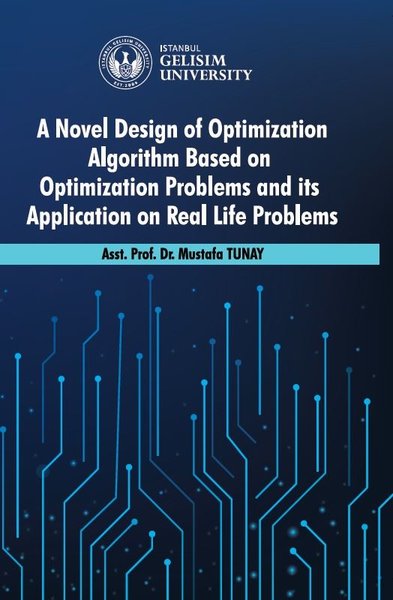A Novel Design of Optimization Algorithm Based on Optimization Problems and its Application on Real

Optimization: Algorithms and Applications present a variety of solution techniques for optimization functions, emphasizing concepts rather than rigorous mathematical details.
The book covers the stochastic method as a solution method for optimization functions. It discusses hypercube evaluation as optimization algorithm. The author shows how to solve benchmark functions, unimodal functions, simple multimodal functions, hybrid functions, and composition functions using the basic of hypercube optimization search algorithm (HOS) and simple modifications of the basic HOS+ code.
The book also introduces a novel method using random perturbation (RP) into two control parameters to solve a wide variety of optimization functions?one of the first optimization book to do so?and develops software code for the proposed algorithm. In addition, it examines neural network models, educational institution problems and warehouse assignments.
The author follows a step-by-step approach to developing the MATLAB codes from the proposed algorithm. The author then applies the codes to solve optimization functions taken from the literature and real-world applications, including portfolio optimization functions, medical data classification problems, timetabling problems, and storage location assignments over time to sustain a high level of picking (access) performance?stocking products in an optimized the assignment of products to storage locations. This hands-on approach improves your understanding and confidence in handling different solution methods.
Chapter 1: Introduction: The optimization algorithms and its applications present a variety of solution techniques for optimization functions, emphasizing concepts rather than rigorous mathematical details.
Chapter 2: The Design of Hypercube Optimization Search Algorithm (HOS): The original algorithm is called hypercube optimization search algorithm (HOS) to find a better solution for optimization problems. The main steps of the algorithm comprise the initialization process, the displacement-shrink process, and the searching areas process. All details in the original algorithm have been represented in this chapter.
Chapter 3: The Design of Improved Hypercube Optimization Search Algorithm Based on Random Perturbation: The original algorithm has been renewed by a new module using a random perturbation (RP) into two control parameters to solve a wide variety of optimization problems in the original search processes. A novel RP is defined to improve the control parameters and is constructed of the algorithm. All details in the improved algorithm have been represented in this chapter.
Chapter 4: Test Functions: A set of experiments are done in order to test the performance of the original algorithm and the improved algorithm. The different benchmark functions that are obtained from different research works, for testing the designed algorithm are described. Mathematical formulas and test areas of the test functions, and their important characteristics are presented. The information for standard benchmark functions and definitions of CEC'14 test suite functions are represented in this chapter.
Chapter 5: Simulation of Test Functions: All test functions used in the simulation stage of the HOS algorithm and the improved HOS algorithm are described. The performances of both algorithms are evaluated using benchmark functions and test functions (CEC'14) on different dimensions and are compared with the performance of several comparative optimizer algorithms using benchmark functions on many different types of dimensions.
Chapter 6: The Design of the Hypercube Optimization Search Algorithm for Timetabling problems: The proposed algorithm is applied to solving a timetabling problem which is very difficult to solve for many institutions of higher education and has resulted in a significant increase in their complexity.
Chapter 7: Hybrid Hypercube Optimization Search Algorithm and Multilayer Neural Network for Medical Data Classification: In medical informatics, the classification of medical data is one of the most challenging tasks because of the uncertainty and nature of healthcare data. This chapter proposes the use of the HOS algorithm for training multi-layer perceptron (MLP), one of the most extensively used Neural Networks (NNs), to enhance its efficacy as a decision support tool for medical data classification. The proposed HOS-MLP model is tested on four significant medical datasets: orthopedic patients, diabetes, coronary heart disease, and, breast cancer, to assess HOS success in training MLP. For verification, the results are compared with eleven different classifiers and eight well-regarded MLP trainer metaheuristic algorithms.
Chapter 8: Storage Location Assignment Problems Based on Hypercube Evaluation: The proposed optimization algorithm for the optimization of storage location assignment problem e
Optimization: Algorithms and Applications present a variety of solution techniques for optimization functions, emphasizing concepts rather than rigorous mathematical details.
The book covers the stochastic method as a solution method for optimization functions. It discusses hypercube evaluation as optimization algorithm. The author shows how to solve benchmark functions, unimodal functions, simple multimodal functions, hybrid functions, and composition functions using the basic of hypercube optimization search algorithm (HOS) and simple modifications of the basic HOS+ code.
The book also introduces a novel method using random perturbation (RP) into two control parameters to solve a wide variety of optimization functions?one of the first optimization book to do so?and develops software code for the proposed algorithm. In addition, it examines neural network models, educational institution problems and warehouse assignments.
The author follows a step-by-step approach to developing the MATLAB codes from the proposed algorithm. The author then applies the codes to solve optimization functions taken from the literature and real-world applications, including portfolio optimization functions, medical data classification problems, timetabling problems, and storage location assignments over time to sustain a high level of picking (access) performance?stocking products in an optimized the assignment of products to storage locations. This hands-on approach improves your understanding and confidence in handling different solution methods.
Chapter 1: Introduction: The optimization algorithms and its applications present a variety of solution techniques for optimization functions, emphasizing concepts rather than rigorous mathematical details.
Chapter 2: The Design of Hypercube Optimization Search Algorithm (HOS): The original algorithm is called hypercube optimization search algorithm (HOS) to find a better solution for optimization problems. The main steps of the algorithm comprise the initialization process, the displacement-shrink process, and the searching areas process. All details in the original algorithm have been represented in this chapter.
Chapter 3: The Design of Improved Hypercube Optimization Search Algorithm Based on Random Perturbation: The original algorithm has been renewed by a new module using a random perturbation (RP) into two control parameters to solve a wide variety of optimization problems in the original search processes. A novel RP is defined to improve the control parameters and is constructed of the algorithm. All details in the improved algorithm have been represented in this chapter.
Chapter 4: Test Functions: A set of experiments are done in order to test the performance of the original algorithm and the improved algorithm. The different benchmark functions that are obtained from different research works, for testing the designed algorithm are described. Mathematical formulas and test areas of the test functions, and their important characteristics are presented. The information for standard benchmark functions and definitions of CEC'14 test suite functions are represented in this chapter.
Chapter 5: Simulation of Test Functions: All test functions used in the simulation stage of the HOS algorithm and the improved HOS algorithm are described. The performances of both algorithms are evaluated using benchmark functions and test functions (CEC'14) on different dimensions and are compared with the performance of several comparative optimizer algorithms using benchmark functions on many different types of dimensions.
Chapter 6: The Design of the Hypercube Optimization Search Algorithm for Timetabling problems: The proposed algorithm is applied to solving a timetabling problem which is very difficult to solve for many institutions of higher education and has resulted in a significant increase in their complexity.
Chapter 7: Hybrid Hypercube Optimization Search Algorithm and Multilayer Neural Network for Medical Data Classification: In medical informatics, the classification of medical data is one of the most challenging tasks because of the uncertainty and nature of healthcare data. This chapter proposes the use of the HOS algorithm for training multi-layer perceptron (MLP), one of the most extensively used Neural Networks (NNs), to enhance its efficacy as a decision support tool for medical data classification. The proposed HOS-MLP model is tested on four significant medical datasets: orthopedic patients, diabetes, coronary heart disease, and, breast cancer, to assess HOS success in training MLP. For verification, the results are compared with eleven different classifiers and eight well-regarded MLP trainer metaheuristic algorithms.
Chapter 8: Storage Location Assignment Problems Based on Hypercube Evaluation: The proposed optimization algorithm for the optimization of storage location assignment problem e
| Taksit Sayısı | Taksit tutarı | Genel Toplam |
|---|---|---|
| 1 | - | - |
| 2 | 123,75 | 247,50 |
| 3 | 88,28 | 264,83 |
| 4 | - | - |
| 6 | 45,79 | 274,73 |
| 9 | 31,49 | 283,39 |
| Taksit Sayısı | Taksit tutarı | Genel Toplam |
|---|---|---|
| 1 | - | - |
| 2 | 123,75 | 247,50 |
| 3 | 91,33 | 273,98 |
| 4 | - | - |
| 6 | 45,38 | 272,25 |
| 9 | 31,49 | 283,39 |
| Taksit Sayısı | Taksit tutarı | Genel Toplam |
|---|---|---|
| 1 | - | - |
| 2 | 123,75 | 247,50 |
| 3 | 88,28 | 264,83 |
| 4 | - | - |
| 6 | 45,38 | 272,25 |
| 9 | 31,49 | 283,39 |
| Taksit Sayısı | Taksit tutarı | Genel Toplam |
|---|---|---|
| 1 | - | - |
| 2 | 123,75 | 247,50 |
| 3 | 88,28 | 264,83 |
| 4 | - | - |
| 6 | 45,58 | 273,49 |
| 9 | 31,49 | 283,39 |
| Taksit Sayısı | Taksit tutarı | Genel Toplam |
|---|---|---|
| 1 | - | - |
| 2 | 123,75 | 247,50 |
| 3 | 88,28 | 264,83 |
| 4 | 67,44 | 269,78 |
| 6 | 45,38 | 272,25 |
| 9 | 31,49 | 283,39 |
| Taksit Sayısı | Taksit tutarı | Genel Toplam |
|---|---|---|
| 1 | - | - |
| 2 | 123,75 | 247,50 |
| 3 | 88,28 | 264,83 |
| 4 | - | - |
| 6 | 45,38 | 272,25 |
| 9 | 31,49 | 283,39 |
| Taksit Sayısı | Taksit tutarı | Genel Toplam |
|---|---|---|
| Tek Çekim | 247,50 | 247,50 |
| 2 | 123,75 | 247,50 |
| 3 | 88,28 | 264,83 |
| 4 | - | - |
| 6 | 45,38 | 272,25 |
| 9 | 31,63 | 284,63 |






